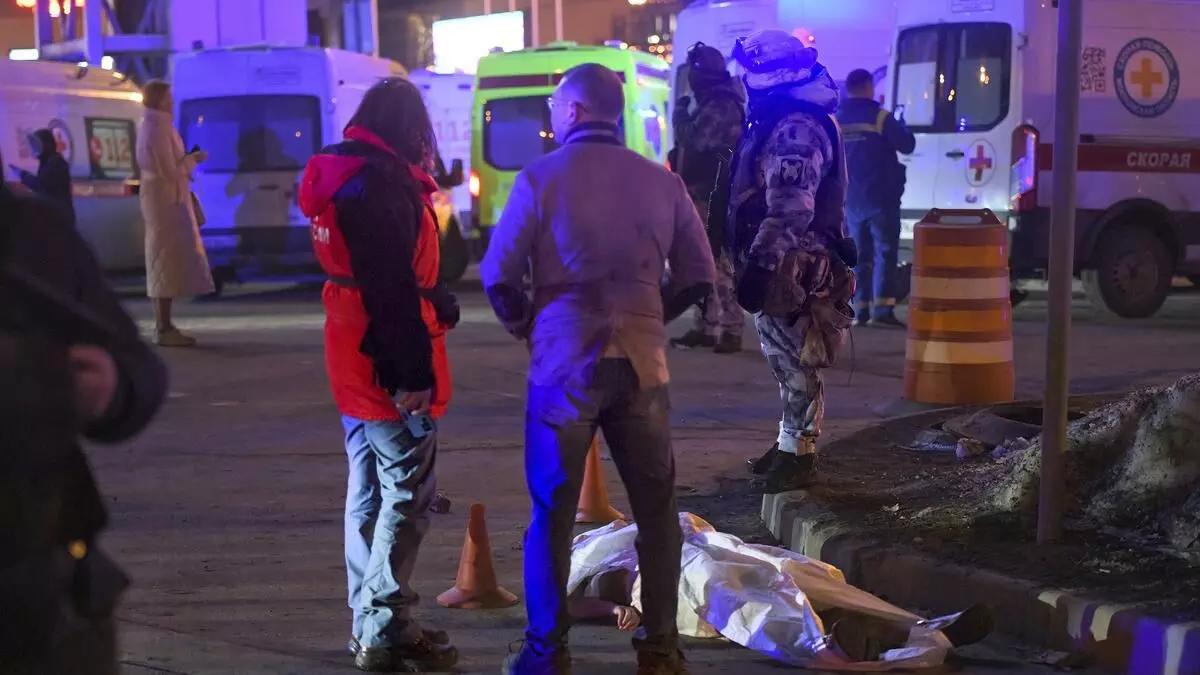Chilling onslaught
Although the recent terror attack in Moscow has exposed the vulnerabilities of Russian security apparatus, Putin’s past record of tackling such threats presents the possibility of foolproof safeguards

After maintaining a silence for quite some time, Russian President Vladimir Putin stated that radical Islamists where behind the last week’s attack on a Concert Hall outside Moscow. It may be recapitulated that on March 22, camouflaged gunmen had stormed into Crocus City Hall, off Moscow, firing indiscriminately—killing over 137 people and grievously injuring many more. This terror assault sent shockwaves all around the world as Islamic States of Iraq and Syria (Khorasan) (ISIS-K) claimed responsibility for the attack, and eleven people have been detained in connection for this dastardly act. While categorically stating complicity of the Islamic ultras for perpetrating this attack, President Putin in his televised meeting (March 24), however, did not pinpoint involvement of the affiliate of ISIS. It is common knowledge that the ISIS(K) has been repeatedly saying that it was responsible for the attack. Significantly, the US intelligence has been consistent in its assertions that is was ISIS that was involved, and this was independently corroborated by the French President, Emmanuel Macron. In fact, the US had warned Moscow confidentially on March 7 itself about the possible attack.
During his live meeting on the TV, President Putin also claimed with confidence that the terror atrocity may be just a link in a whole series of attempts by those who have been at war with Russia since 2014, with their hands being of what he said the Neo-Nazi-Kyiv regime. This was an obvious reference to Ukraine which is currently engaged in a long-drawn war with Russia.
According to Al Jazeera, a Moscow Court identified the four suspects behind the attack as Dalerdzhon Mirzoyev, Saidakrami Rachabalizoda, Shamsidin Fariduni, and Mukhammadsobir Faizov—all citizens of Tajikistan, charged with committing a group terrorist attack.
Russia, in the meantime, has stepped up its rhetoric against the terrorists, as Dmitry Medvedev, the deputy chairman of Russia’s Security Council, said Russia would target those behind the deadly shooting, wherever they were from and whoever they were. He had previously spoken of the need to meet “death with death” while some legislators wanted to discuss whether the death penalty should be re-introduced.
Furthermore, a video lasting about a minute and a half, apparently filmed by the gunmen, has been posted on social media accounts typically used by ISIL, according to the SITE intelligence group.
As per a well-known columnist on security, when Vladimir Putin came to power in 2000, he made one thing clear that he would be different from his predecessors—Boris Yeltsin and Mikhail Gorbachev, in his response to terrorism. That difference would be manifested in his declared determination to never to wilt under pressure. Like many officers trained in the KGB and traumatised by the collapse of the Soviet Union, Putin was convinced the Russian state was so fragile that it could collapse at any moment if its enemies were given an inch. To Putin and his KGB friends, the famous phone call made in 1995 by Yeltsin’s prime minister, Viktor Chernomyrdin, to a terrorist leader to save the lives of hostages in a hospital in Budyonnovsk, was the worst possible way of dealing with terrorists. In a live broadcast on Russian television, Chernomyrdin’s call resulted in the release of women and children and the end of the first Chechen war, which was seen as a humiliation for the Russian army. It also led to a traumatic soul-searching in the Russian security services and the special forces. Putin will have none of that.
Subsequently, Putin has responded to every new terrorist attack with more restrictions that have made it impossible to bring any public pressure to bear on him. Strict information censorship around terrorist attacks was introduced. This columnist was investigated by the FSB (the Federal Security Services) for the first time for publishing a critical account of an FSB operation in October 2002, when more than a thousand people were taken hostage in a Moscow theatre. The special operation ended with a loss of more than 130 hostages, most killed by a gas used by the FSB. Any criticism of the Russian security services’ response was ruled out.
Importantly, the FSB is also competent at investigating attacks after the event, thanks in large part to video surveillance, combined with up-to-the-minute facial recognition technology. This was seen in the FSB’s recent response to the Crocus city hall attack in Moscow. Four suspected perpetrators were identified, pursued and arrested within 24 hours.
Whatever, the recent terror attack has revealed that even Russia is not spared from daring terror attacks, and the Russian intelligence and security apparatus are equally vulnerable. Yet, judging by Putin’s past actions and tough measures, it’s very likely that a foolproof system would be in place to ward off future attempts of terror. Also, intelligence would be revamped, especially maintaining an extra vigil on the Tajik religious extremists, and a discreet eye on similar elements in other Commonwealth of Independent States (CIS) states cannot be ruled out as a precautionary measure.
The writer is a retired IPS officer, Adviser NatStrat, and a former National Security Advisor in Mauritius. Views expressed are personal




